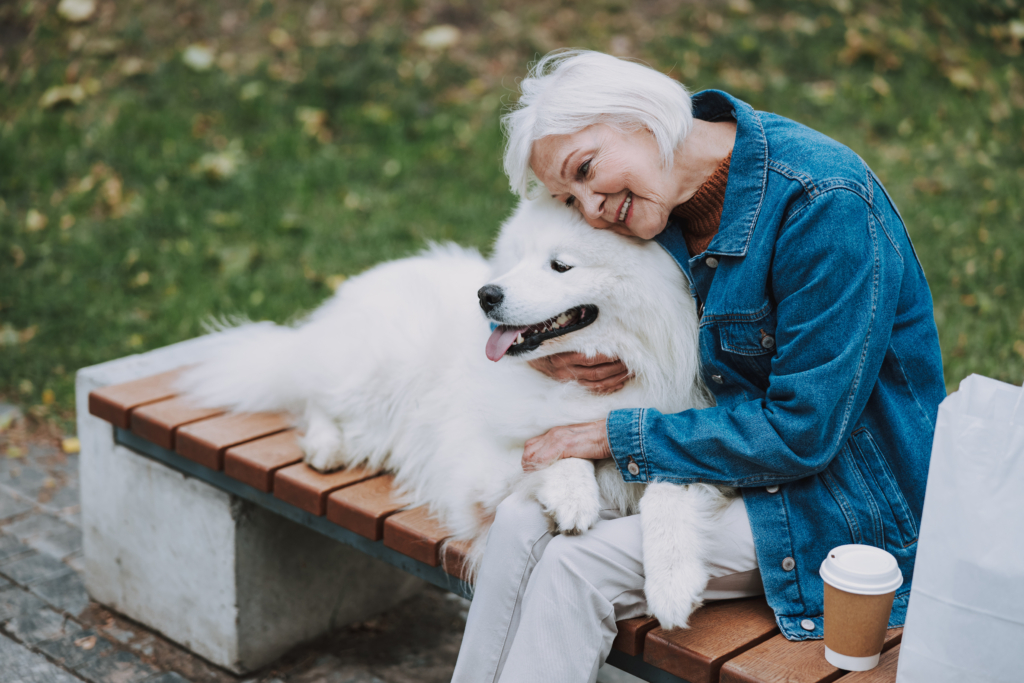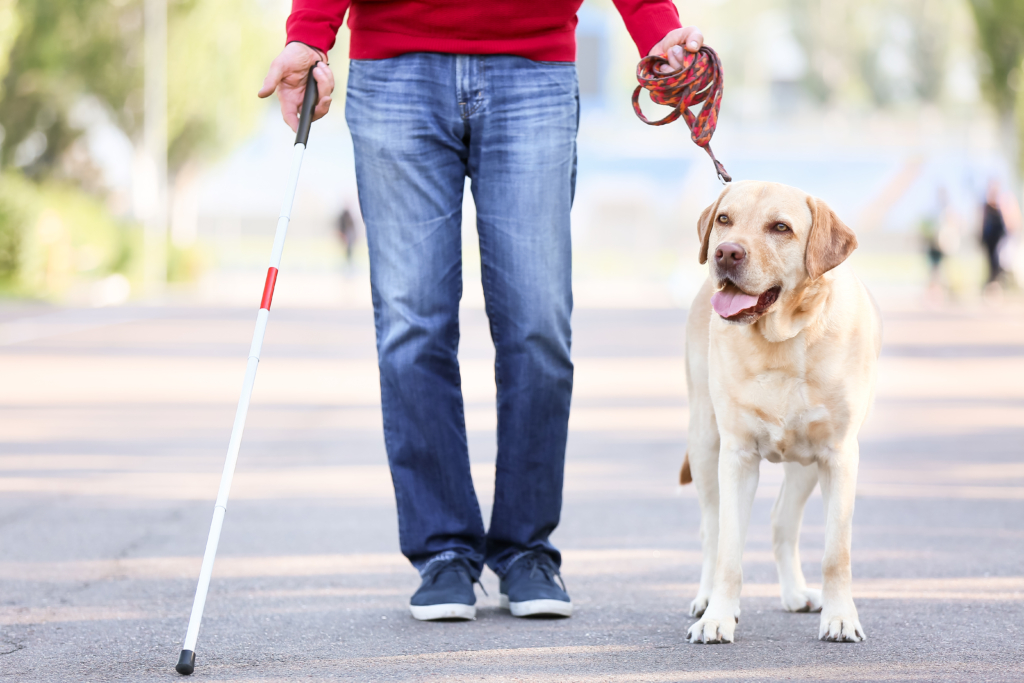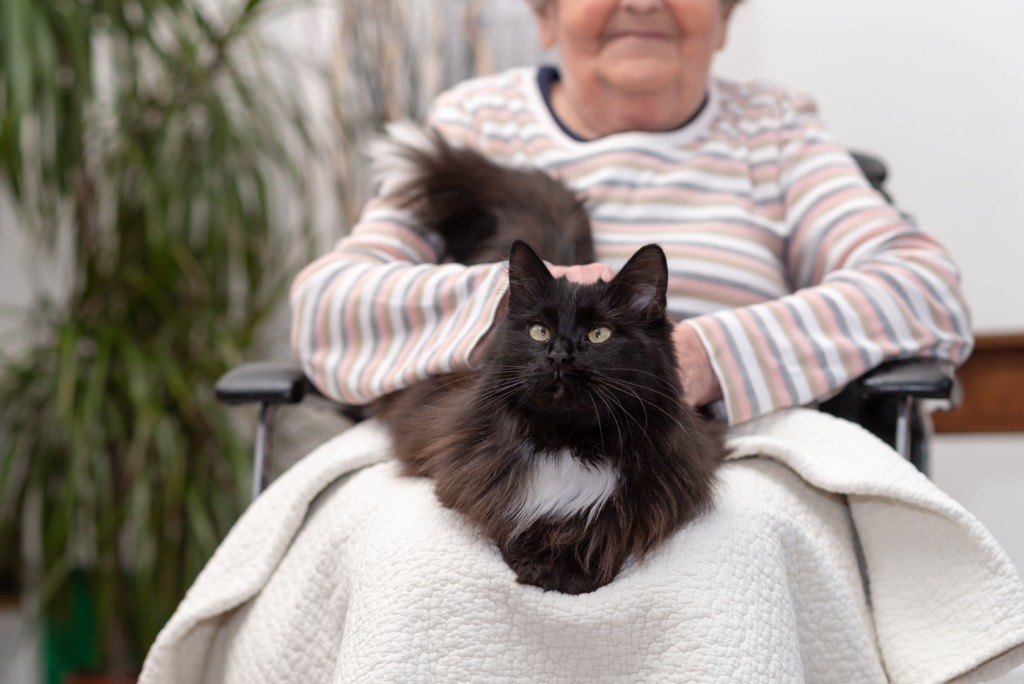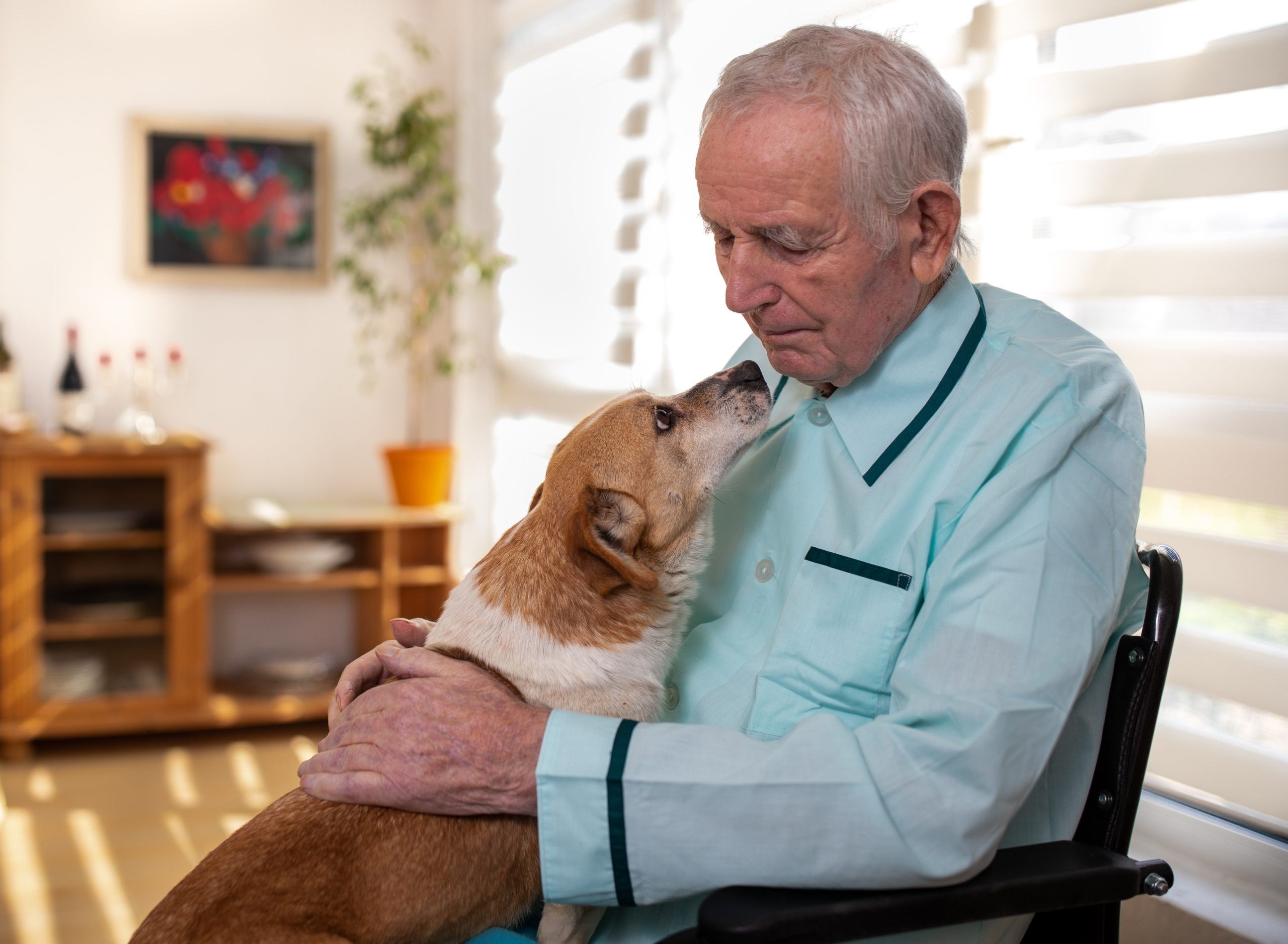
Are pets a really a good choice for seniors? As our parents age, it can become increasingly difficult to keep them entertained and engaged. One option that is growing in popularity is to get an animal companion for them, such as a dog or cat. Let’s take a look at the pros and cons of having pets for our aging parents.
One of our “checklists” that we share with our community is the “11 Signs Your Aging Parent May Need Help in the Home,” (you can grab that HERE) actually addresses this issue as a potential concern for how your parents are managing at home. How are they taking care of their pets? Let’s take a better look at if a pet is a good choice for your aging parent.

Pros of Having Pets for Seniors
One of the most obvious advantages of having pets for seniors is companionship. Seniors often feel isolated and lonely, especially if they don’t have family that can visit regularly. If a spouse is lost sometimes people suggest a pet to help keep them company. A pet provides unconditional love, which can help fill some of those emotional needs. Additionally, if your parent has mobility issues, having a pet could help them stay active throughout the day by taking regular walks or playing together in the yard. Lastly, some studies have even shown that pet owners tend to live longer than non-pet owners!
Furthermore, studies have shown that interacting with animals can reduce stress levels in seniors, promoting better overall mental health and wellbeing.

We all have heard stories about all the joy pets bring to our seniors. We have seen many therapy dogs in action. There are dogs that can tell when someone is going to have a seizure, and there are dogs that can tell when a diabetic’s blood sugar is too low. There are dogs that help with anxiety as well as emotional support. These are all amazing benefits. Other pets can be used as “therapy” pets including cats, horses, rabbits, birds, and even Llamas!
Cats can be a good choice for seniors that are less active. There is still feeding, making sure they have clean water and then there is the litter box. You can run into problems for those seniors that like to have “multiple” cats or dogs!

The Drawbacks of Having Pets for Seniors
As wonderful as it is for seniors to own pets, there are some drawbacks worth considering before making the decision. For starters, owning a pet is a huge responsibility – especially for those who may already be having difficulty taking care of themselves due to age or health issues.
There are some potential drawbacks when it comes to getting an animal companion for our seniors. For starters, they will need to be able to provide food and veterinary care – both of which can be costly over time. Additionally, depending on their physical ability, they may not be able to provide the level of exercise and attention needed by certain breeds or types of animals (e.g., cats vs dogs).
Finally, if your parent passes away before their pet does, you may need to find a new home for the animal – something that could add more stress and sadness during an already difficult time.
Some questions to consider would be who would care for or take over the pet if the owner was hospitalized or needed to move to alternative senior living housing such as a nursing home or an assisted living. Some assisted living facilities allow small pets, but many do not. Some hospitals will allow pets to visit if they meet certain requirements but an alternative for pet care will be necessary.
When choosing a dog will regular grooming appointments be necessary? Does the senior have access to reliable transportation or a ride to take the pet on a regular basis to the vet or groomer? Dog parks are now very popular. If your senior has a “high energy” pet, will they be able to meet their exercise needs?

When we address mobility issues or concerns with pets, we have mentioned dogs mostly. There can be concerns with cats as well. My friend shared a story about her dad. His cat was the reason for one of his falls. He kept the litter box in the basement for odor control and fell going down the stairs to attend to the litter box. Cats can have their challenges too so please consider all the necessary tasks that would be necessary in proving a pet for an aging parent or grandparent.
One more thing that we need to take into consideration as a potential drawback or even a “pro” and that is traveling. If your senior loved one likes to travel now that they are retired, how “portable” is the pet? Can they easily take the pet with, or will they need to find someone to care for their animal while they are gone? Boarding expenses can be high especially for those seniors on a fixed budget. Do the places they travel to accommodate pets? Just some more food for thought.
What Type of Pet Is Best For Our Seniors?
The type of pet you choose will depend on several factors such as your parent’s lifestyle, health condition and living arrangement. For example, if they live in an apartment building then cats may be better than dogs due to space limitations. On the other hand, if your parents still live in a house with plenty of outdoor space then either cats or dogs could work well – just make sure they are able pick up after their pet messes! If your parent has special needs then there are many organizations that offer trained service animals as well as therapy animals as we mentioned earlier, which can help with anxiety and depression symptoms as well as providing companionship too!

When choosing a pet for your senior loved one it’s important to consider what kind would fit best into their lifestyle – both from an activity level standpoint (i.e., how much exercise does this type of pet need?) as well as budget-wise (i.e., how much does this type typically cost?). Common types like cats or small dogs tend to do well in apartments/homes where space is limited; however, birds or fish are great alternatives if you don’t have much room at all!
Ultimately though it comes down to personal preference – so finding out what type they think would be best could be beneficial too!
Conclusion:
Having a pet in our elderly years offers many benefits from companionship & conversation opportunities, physical activities such as walking & playing together outdoors & even providing emotional support during difficult times by giving us someone else who loves us unconditionally no matter what our age may be!
Deciding whether or not our seniors should get a pet isn’t always easy, but it is certainly worth considering given all the potential benefits that come with having one around! There are numerous things to consider such as type of pet (cat vs dog), lifestyle needs (space requirements) and financial considerations (food/veterinary care) so make sure you do your research before making any decisions! Ultimately though it’s important to remember that animals can provide companionship which is often invaluable when dealing with loneliness in old age – so don’t discount this factor when making your decision about whether getting a pet would be beneficial for your senior loved one! It may just be all about making the best choice.

With careful thought & research into what kind of animal would work best in our situation – whether it’s something low maintenance like fish or birds or something higher energy like cats & dogs – we can ensure we find just the right furry companion who will bring us joy throughout all stages of life! Patient Advocates are always willing to assist in helping to make informed decisions. If you don’t have the time to do the research on what may be the right fit for a pet for your aging loved one, finding the right pet could be one of those things! We would be happy to help.
We have included some resources here that may be of benefit in choosing the right pet. Feel free to get on our “In the Know List” to inform you of new posts along with weekly tips and strategies for caring for your aging loved one. Support is so important as our mission is to reduce the stress and overwhelm of caring for an aging parent, spouse, or grandparent. You can get on the this HERE and receive our checklist for “11 Signs Your Aging Parent May Need Help in the Home.”
We hope to see you back here soon so take care for now,
Pam and Linda
Your Nurse Advocates
Website: https://yournurseadvocateconsulting.com/
Resources:
American Kennel Club-Registration of Purebred Dogs
US Service Dogs.Org
https://www.newsweek.com/30-best-dog-breeds-seniors-1563090 https://www.americanhumane.org/fact-sheet/cats-seniors/






